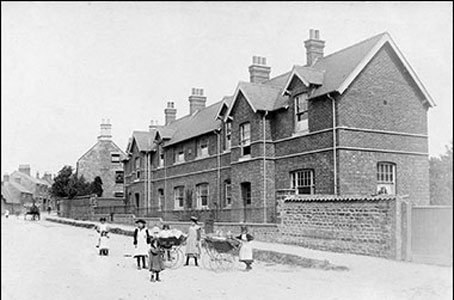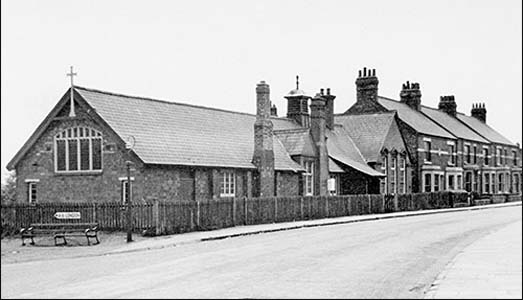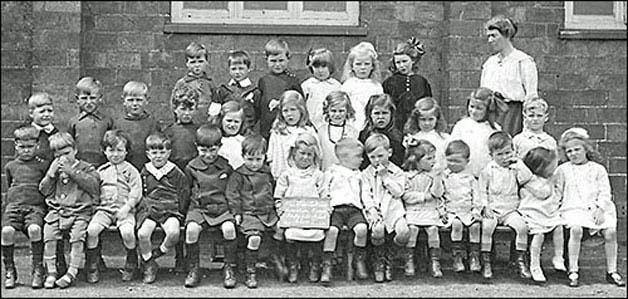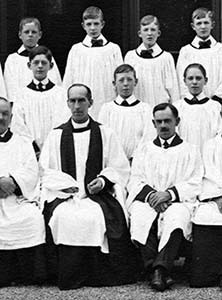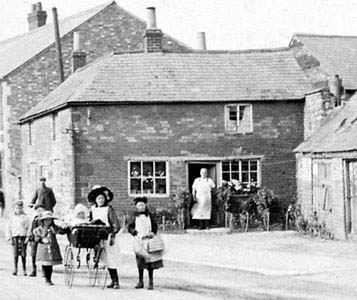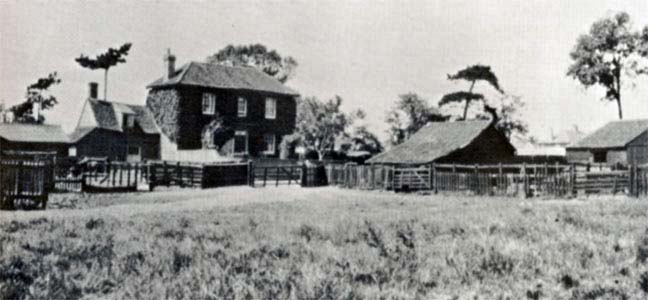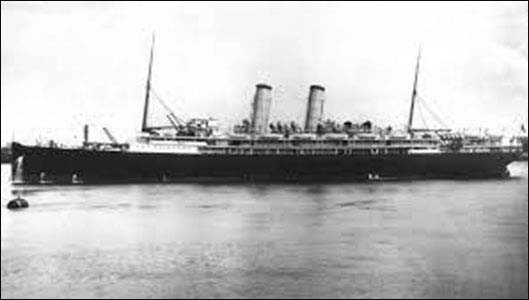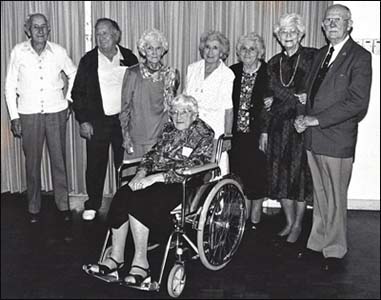| Collated by John Meads 2022 | ||||||||||||||||
|
||||||||||||||||
|
||||||||||||||||
| Ernest Edward Dainty (known in later life as Ernie Dainty) was born in 1908 to George Samuel Dainty and Fannie Eliza Dainty, nee Judd. In 1901 the family consisting of George aged 28, a clicker, born at Barton Seagrave with wife Fannie E. aged 26, born at Burton Latimer and their two eldest children, Gladys E. aged five and Harold aged one year. They are recorded on the census as living in Barnwell Street, Kettering. Fanny died in 1909 and at the time of the April 1911 census George and the baby Ernest are in the Kettering Workhouse. The older children are at Burton Latimer in the Cottage Homes. They are recorded as – Harold aged 11, Cyril aged 9, Olive aged 7 and Wilfred aged 5, all born at Kettering. Elsie, aged 15, is elsewhere as a servant. Despite what he says below, according to its registers, Ernest started school at the Finedon Road Church of England Infants' School on 25 September 1911 when he was three years old. He died at Wellington Point, Brisbane, Queensland, Australia, in January 1997 These are Ernest's recollections: These will begin in my sixth year, going across the road to school in which I spent about three years, going to Post Office to get a book for teacher (Miss Tookey) called "London Opinion", reading papers about the war to the other kids.
Shifted into another building, shivering with fright because of Zeppelins flying over England, dropping bombs. Joined Boy Scouts walked to Gretton (22 miles) to camp. Joined church choir, paid 2/6 a quarter. Went on bus trip with choir to Bedford. Making seven beds before going to school every morning, also scrubbing bedroom floor and hallway and stairs, polishing brass plate outside front door. Sweeping yard in the autumn about 1 acre, piling up the leaves from one sycamore tree, one big walnut tree, one horse chestnut tree, two apples and one pear tree, one plum tree. Invited out to tea by an old lady, prunes and rice for sweets, went back after Sunday night’s service for second helping. Spent winter nights sitting around the fire till 8-30pm, no books or games. Looked through the keyhole and saw little boy dead on the bed. Children who wet the bed were lined up for a beating on bare bottoms with slipper then had to sit on potties from 6pm till 10pm. Big boys lined up without shirts to be inspected for cleanliness any that didn’t satisfy received a good clout on the ear. Walked eight miles to see my Dad he was building a doll’s house with match boxes. Had half an orange for Christmas. Most of our school holidays were spent in a big yard with a eight foot wall around it, we had one see-saw, one big swing and a little one. We had to go to church and Sunday School twice a day. The Superintendant’s wife used to practice which slap hurt the most, the open handed one or a sharp short slap. I was walking to see my Dad when a man gave a lift in a trotting gig, his name was Tom Dainty. On summer nights I had to carry water in a can to water the garden till 8pm. Helped myself to black currants while doing the job. Laid over the desk at school and received a flogging for telling a lie about a mistake I had made in my book. Throwing a stick up the pear tree to dislodge some fruit, first up in the morning to see if I had any luck. Camping with boy scouts at Cranford went down a coal mine. [This would have been an ironstone mine not a coal mine] In bed with mumps. Had to sing grace before and after meals. Taking boots to the cobbler every Monday morning, picked up the same on Friday (Mr Taylor) receiving a penny with which I bought one ¼ lb of dates.
Confined to bed on Sunday night with dry bread and water, everyone gone to church, reason for confinement: telling the kids at Sunday School we had burned pudding for dinner. Threw a chair leg up to the walnut tree to fetch down some nuts, it ricocheted from a limb, I ducked and it went through a window, I disappeared. One boy climbed over the wall and ran away, he was soon found and brought back again. I had to scrub the dining room floor 40 x 20 for punishment, I had no idea what I had done, I had to this after tea which was at 6pm. Looking back now I think someone must have had an upset liver. Received the cuts at school for jumping over the wall to retrieve a ball, the kid who owned the ball brought me a bunch of roses after he had been home for lunch, I had no idea what to do with them as we still had a half day to do at school. Brother Wilf calls to see me now and again, last time he called he brought me a sick tie. Brother Cyril has never been to see me. Brother Harold is in the navy and calls when he is home on leave. Sisters Olive and Elsie have never called. I went to spend a week-end near London with one of my aunts, also a week end to the home where Wilf lives. They were the main highlights of my life. I also visited some relatives at Peterborough, the male relative was a caretaker at the cathedral and lived on the premises. My Dad called at the school to see me and I was allowed out to go and talk to him. I must have been very close to leaving as I was in class eight and that was as high as we went. Surprise? It was Christmas again and I received a writing pad, who from I had no idea. There were no Christmas trees or celebrations. I think this must have been the end of my schooling. It was soon after this that I was sent on my first job to a small village near Market Harborough, this place couldn’t even be called a village, there were about three houses, the shop was on the lower floor of a house. It was mainly a farming area, I went to one of these farms with a big old stone house, milking sheds and stables. I was house boy, setting tables, washing up and doing odd jobs. I didn’t last long on that job. From there I worked in a hotel I think it was called The Falcon but I can’t remember just where it was. My duties cleaning all the visitors boots or shoes, washing op the dishes and scrubbing floors. I left there and went to live with my eldest sister (Elsie). It was whilst living there I found a job in a boot factory, that meant a walk of eight miles a day. The name of this place was Newton just a small village with about one dozen houses, it was a farming area. After a few months I went to live with my Auntie Frances, my father’s sister. She lived in a small village with a dozen or more houses, a church and a blacksmith’s, the post office was the lower floor of a house. I still had to walk eight miles a day to work and back. The factory I was working was owned by Munn and Carvell. My wage 9/- a week. I was sacked from this job for going to the Trades Hall because my uncle felt I was underpaid. I was out of work for a while until my Aunt showed an advertisement in the paper for boys to come to Australia, Canada or NZ. I don’t know why I chose Australia. Anyhow I sent for papers to fill in and sent them away. They took so long in returning my application I went and found another job in a boot factory owned by Bailey, Payne & Muddeman.
Well now I am on my way to Australia, I am on the train, going to the docks and aboard the ship Osterley. May 31st leaving England, six weeks later I arrived in Brisbane July 13th 1925, Thursday. Twenty seven other boys came out at same time. Went to the People’s Palace, was sent to Red Hill to old men’s home to work, had one look at the place and what I had to do and walked out back to the P.P. Was then sent to a dairy farm at Na........ on the Northern Line. I stayed there about three months. My next job was at Milora on the Branch Line, dairying again, 3 years, left there and rode sixty five miles to my next job at Chingee Creek above Beaudesert . Left there after six months and worked at Moggill, from there I went to Brookfield. From there I went to Cedar Creek to look after a banana farm, and a few cows. It was there I met a young lady Sarah Yellowley, we were married a year later and moved to Brisbane. [9th March 1932] Bought small business at Greenslopes, but sold out a few months later. Rented a house at Camp Hill, no job, bought horse and cart, selling groceries but not a success. Got a job digging out for a tennis court 6/- a day, also a job in the markets. Left Camp Hill and shifted to Bulimba. Took over Grandma’s store for a few years. Offered a job at Vaccuum Oil, had to be checked by a doctor and photographed, got the job. Joined the army 1939 Feb. (Militia) Called into the army as war had broken Sept. 1939 until the end of the war. Was discharged Oct. 1945. Went back to Vacuum Oil after. Worked 5 years. Left there and worked at Amalgamated Furnishing in the valley. Later worked at Trittons, George St. Had trouble with my leg and had to leave. Found a job at Isles Love, Adelaide St. Left there to manage C.......... Store. Offered a job at Drive-in Theatre, stayed 6¼ years. Went on working tour of NZ. Started gardening on my own when back in Australia. Left Bulimba for Capalaba July 1951. Left Capalaba for Wellington Pt. Oct. 1963.
|
||||||||||||||||
